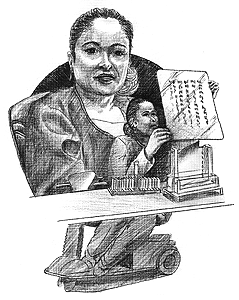



By Joan Killough-Miller
"I'm a triple threat," says Liz Mendez of her minority status as a Hispanic, a person with a physical disability, and a woman in the upper echelons of scientific research. Mendez is a postdoctoral fellow in the Department of Embryology at the Carnegie Institution of Washington, located on the campus of Johns Hopkins University in Baltimore. Her current interest is RNA splicing and processing. Although she can joke about her situation, she takes her work seriously and lets nothing interfere with her ability to do it without impediment.

At Rockefeller University, where she earned a Ph.D. in cell biology in 1994, she made history as the first disabled student to graduate, and the first to be granted funds for a technician to aid her with her scientific work. She shrugs off the distinction and explains that, ordinarily, a laboratory can be tailored for her use by lowering tables and modifying equipment so she can reach it from her wheelchair. In this case, some equipment could not be adapted, so an assistant was needed. "They understood the need for this," she says. "They were extremely accommodating and supportive."
Born with spina bifida -- a neural tube birth defect -- Mendez was an early advocate for handicapped rights. In San Juan, where she attended high school, she belonged to the Spina Bifida Association of Puerto Rico, and was once the island's Miss Wheelchair. "It gave me an opportunity to put forth to the general population that not all handicapped people are older or lethargic; many are active and able to contribute, if given the chance."
Today she lives out that message, sometimes giving lectures for the National Science Foundation on her experiences as a physically challenged person in the scientific community. "Because of my background, I have become a vocal advocate for making institutions of higher learning a bit more sensitive to the needs of the physically impaired. There aren't many women who proceed down this path, and Hispanics are also severely underrepresented."
Mendez also sought to widen the path for ethnic minorities in the sciences by implementing a summer program at Rockefeller University that brought promising minority high school students into the lab as interns. Mendez is proud of her role in the program. Although she had a natural facility for science and knew early on that she wanted to study biology, she says she had no one to emulate.
She was one of the first handicapped students to attend WPI, at a time when there were few Hispanics and women were still relative newcomers. Rather than making an issue of her differences or using them as an excuse, Mendez made her uniqueness an integral part of her academic program. For her Sufficiency project, she translated a classmate's original play from English into Spanish. For her IQP, she studied handicapped accessibility at four local colleges. "Some buildings at WPI were totally inaccessible at that time," she recalls. "Others were merely difficult."
She shared her findings with college administrators. When she felt her concerns were not being taken seriously, she took the "Interactive" part of her IQP literally, having able-bodied administrators take to wheelchairs to navigate their own campuses.
Mendez did her MQP in molecular biology, conducting research on the transport of small nuclear ribonucleic protein complexes (snRNPs) across the nuclear membranes of cells. The process ensures that introns (nontranslatable portions of RNA) are "spliced" from the coded sequence. If this does not occur, certain proteins produced by the cell are defective or absent. Although a link to a specific disease has not yet been established, Mendez says it is still a hot topic among cell biologists and remains a pet interest of hers.
The WPI Plan provided an ideal education for a self-directed person like Mendez. "I liked the freedom to plan my own curriculum instead of having a set of courses imposed on me." She says that freedom prepared her well for graduate study at Rockefeller, where students are expected to work independently.
In addition to preparing her academically, Mendez says WPI provided good preparation for facing life as a triple minority. "I was fortunate to find many helpful, supportive people, including members of the administration and professors who were very giving of their talent, time and knowledge. I found no hesitation when I asked for a ramp or other accommodation.
"But because I was treated in such a nondiscriminatory way while I was at WPI, it made me a bit naive. When I moved on, I didn't expect to encounter problems. Still, my experience at WPI gave me the confidence to say, 'This isn't right,' when the issue of my disability or my being Hispanic was raised as a concern. I found I could stand up on my own and say, 'Wait a minute, if this wasn't an issue for these folks, why should it be an issue for you?'"